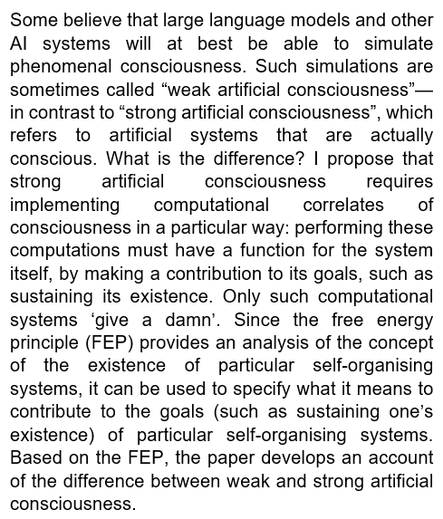Anyone here got the knowledge, time and energy to compare and contrast #Cybernetics and #Friston's #FreeEnergyPrinciple?
#FreeEnergyPrinciple
Conscious AI Is the Second-Scariest Kind
A cutting-edge theory of mind suggests a new type of doomsday scenario
https://www.theatlantic.com/ideas/archive/2024/03/ai-consciousness-science-fiction/677659/
#consciousness #AI #LLM #KarlFriston #TheoryOfMind #entropy #FreeEnergyPrinciple #FreeEnergyMinimization #surprisal #IIT
Self-organization of neurons explained using a mathematical theory
> An international collaboration between researchers at the RIKEN Center for Brain Science (CBS) in Japan, the University of Tokyo, and University College London has demonstrated that self-organization of neurons as they "learn" follows a mathematical theory called the free energy principle.
#mathwinsagain #freeenergyprinciple #neuroscience #learning #whatwecalllearning
Free Energy Principle Predicts Self-Organized Learning in Real Neurons
An international team of researchers has discovered that the self-organization of neurons during learning aligns with the mathematical theory known as the free energy principle.
https://scitechdaily.com/free-energy-principle-predicts-self-organized-learning-in-real-neurons/ #neurons #SelfOrganized #FreeEnergyPrinciple #learning #mice
Testing Predictions of Surprisal Theory in 11 Languages
https://arxiv.org/abs/2307.03667
A fundamental result in psycholinguistics: Less predictable words take longer to process
Theoretical explanation for this finding is Surprisal Theory
https://en.wikipedia.org/wiki/Prediction_in_language_comprehension#Surprisal_theory
Aside: surprisal (surprise) is a tenet of Friston's Free Energy Principle
https://mastodon.social/@persagen/110582825938232359
https://link.springer.com/content/pdf/10.1007/s10539-022-09864-z.pdf
Surprisal of x = log(1/p(x))
...
#SurprisalTheory #KarlFriston #FreeEnergyPrinciple #TheoriesOfConsciousness #surprisal
Preprint: “Could large language models be conscious? A perspective from the free energy principle” https://philarchive.org/rec/WIECLL
This preprint has been submitted to an anthology on the free energy principle, edited by Inês Hipólito, Casper Hesp, and Karl Friston.
#Philosophy #Consciousness #ArtificialConsciousness #FreeEnergyPrinciple @philosophyofmind
#KarlFriston and gang are at it again. They are formalising the notion of intelligence as "as the capacity to accumulate evidence for a generative model of one’s sensed world". In a #reinforcementlearning postulation the reward function is formulated as the need to maximize the evidence for
the agent's own generative model aka it's continued existence
I wonder what people here on @sigmoid.social think about this?
https://arxiv.org/abs/2212.01354
"... a milestone paper outlining a vision for the future of #AI."
🤔
Source of quote: https://twitter.com/neojipc/status/1599834270570549249?t=alMiRL5uXpSiVuRSZqcQfg&s=19
#FutureOfAI #scalinghypothesis
#freeenergy #freeenergyprinciple
Theories of systems and agents focus on mathematical frameworks providing formal #definitions of #systems and #agents that can take into account different features of #biological, #cognitive and #artificial systems, Some examples include: #freeenergyprinciple, #IIT and recent ideas formalised using #categorytheory.
2/
#Introduction time.
TL;dr: maths to formally study #agents, #worldmodels and #representations
I'm currently a Chief Researcher at Araya, a Tokyo based startup with the goal to understand (artificial) #consciousness.
My work focuses on general principles for the #origins of #agency, #life and #cognition. I previously used the #freeenergyprinciple (+ #activeinference) as my main framework, but I'm now looking into other directions, mostly using #categorytheory applied to #systemstheory.
